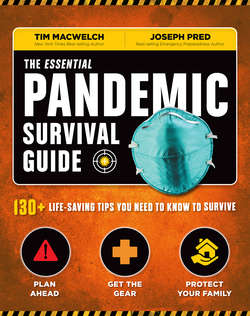Читать книгу The Essential Pandemic Survival Guide - Tim MacWelch - Страница 21
На сайте Литреса книга снята с продажи.
Оглавление15
So many people are afraid during an emergency . . . and most people consider fear to be a bad thing, like some kind of liability or an unpleasantness that we should minimize in our lives. Our instinct of fear, however unflattering, is actually a very helpful tool when used in small doses. Sure, we’re all supposed to laugh in the face of danger and never get frightened over anything, but that’s just Hollywood brainwashing. We’ve all been scared, plenty of times in our lives, and the thing is that the right amount of fear is a good thing. And even though it’s true that unbridled fear can become a hazard in a life or death crisis, fear can also save us.
Here’s why fear is our friend, but panic is our enemy.
ACCEPT YOUR FEARS Fear is our natural instinct concerning
dangerous things. Our fear of heights keeps us from falling to
our death, when it’s working properly. Our fear of snakes keeps us from getting bitten, or at least it’s supposed to. And similarly, our fear of COVID-19 keeps (most of us) from licking doorknobs in public places. That’s right, fear keeps us safe! And when that fear is kept under control, it’s working for us. But when we become overly stressed or fearful, we are often at the mercy of the cocktail of hormones and chemicals that pump through our bodies. It’s quite common that this flush of hormones will lead to panic, which is definitely
working against us.
DON’T PANIC! Panic can be described an unrestrained, illogical, and unthinking fear that is a common response to crisis. This reaction can manifest itself in many ways. If you
panic, you may run around frantically. Or you may be frozen
FACE YOUR FEAR
